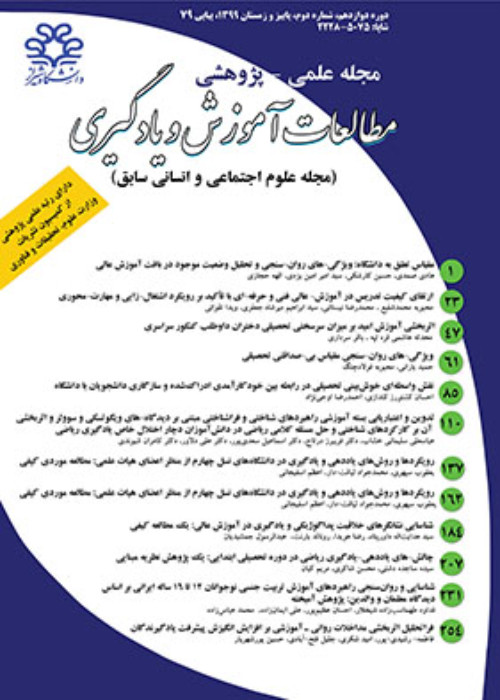Learning Styles as Predictors of High School Student's Educational Performance
Author(s):
Abstract:
IntroductionThroughout human life learning has been are of the important excepts. Since there are a wide number of factors effective in learning, their identification is important in solving problems and shortcomings in an educational system. In addition to such predetermined factors as personality, intelligence quotient, family status, and age, acquired factors are effective in learning. Student's learning styles are among the acquired factors (Snelgroves, et al, 2003). Based on their individual differences, different students use different learning styles for their learning. One of the most effective approaches in studying the student's learning is Kolb's theory of learning styles. According to this theory, learning is a process consisting of four stages of concrete experience, reflective observation, abstract conceptualization, and active experimentation. A learner with the learning style of concrete experience learns from specific experiences, communicates with others, and is sensitive to him / herself and others. A learner with abstract conceptualization who emphasizes on logical analysis of thoughts, has a systematic plan for his/her affairs and acts based on his/her intellectual understanding of situations. The active experimentation learning style includes the ability of accomplishing the affairs and the act of risking and of impressing others through action; finally, those with the learning style of reflective observation act based on exact observation before any judgment, and consider different aspects of an affair to find its meanings. Psychologists believe that in the case of any disharmony between one's learning style and his/her educational field or profession, he/she either drops out of his or her major or feels dissatisfied with his/her educational major (Salehi, et al, 1379). Based on what has been mentioned, the purpose of this research was to study the learning styles as predictors to educational performance. Research hypothesesConsidering the aim of the study, the following hypotheses were considered: 1. There is a link between learning styles and educational performance.2. There are multiple links between learning styles and educational performance.MethodologyThe type of methodology used in this descriptive study is correlation. The population was grade one high school students in Eastern Bandpei, Babol. Based on Morgan's table and through multiple-steps sampling, 210 students were selected as the sample. For identifying student's learning styles, the predictor variable, Kolb's learning styles questionnaire was used. Also, the student's grade point averages were used to determine their educational performance, the criterion variable. For data analysis, the statistical methods of Pearson's correlation coefficient and multiple regression were used.ResultsThe results showed that there was a significant positive link between learning styles of abstract conceptualization and active experimentation and educational performance; and there was a significant negative link between concrete experience and educational performance. Moreover, the results showed that there was no significant link between reflective observation and educational performance. The results obtained from multiple regression analysis showed that the multiple-correlation coefficient between learning styles and educational performance (MR) was 0/24. It indicates that learning styles identify 24% of the variance of the educational performance. Also, the results obtained from multiple regression with step-by-step method showed that the learning styles of abstract conceptualization and active experimentation were predictors of the educational performance.Discussion and conclusionThe link between learning styles and educational performance causes the learners to learn the materials better and have better educational performance in different educational periods. Based on their individual differences, different students use different learning styles; for example, those students who learn through the learning style of reflective observation comprehend the thoughts and situations from different viewpoints; and in learning situations they always rely on their own tolerance, concreteness and exact judgment; and for the purpose of belief construction they refer to thoughts and theories. In contrast, those who learn with the concrete experience style have a personal encounter with the situations, and a personal and intuitive viewpoint toward the issues; or learners with the learning style of abstract conceptualization have the highest scores in their educational progress. Psychologists believe that if there is disharmony between one's learning style and his/her educational major or profession, s/he either drops out of his or her major or feels dissatisfied with his/her educational field (Salehi, et al, 1379). Specifically, this viewpoint may be true more for adult learners. Due to their ages and high experiences, adult learners in comparison to any other groups have more varieties and various viewpoints in learning (Tennant, 2004). When there is a correspondence between learner's learning and their preferred learning styles, the degree of their learning is much more than when their learning styles are ignored.
Language:
Persian
Published:
Studies in Learning & Instruction, Volume:2 Issue: 2, 2012
Page:
39
magiran.com/p966158
دانلود و مطالعه متن این مقاله با یکی از روشهای زیر امکان پذیر است:
اشتراک شخصی
با عضویت و پرداخت آنلاین حق اشتراک یکساله به مبلغ 1,390,000ريال میتوانید 70 عنوان مطلب دانلود کنید!
اشتراک سازمانی
به کتابخانه دانشگاه یا محل کار خود پیشنهاد کنید تا اشتراک سازمانی این پایگاه را برای دسترسی نامحدود همه کاربران به متن مطالب تهیه نمایند!
توجه!
- حق عضویت دریافتی صرف حمایت از نشریات عضو و نگهداری، تکمیل و توسعه مگیران میشود.
- پرداخت حق اشتراک و دانلود مقالات اجازه بازنشر آن در سایر رسانههای چاپی و دیجیتال را به کاربر نمیدهد.
In order to view content subscription is required
Personal subscription
Subscribe magiran.com for 70 € euros via PayPal and download 70 articles during a year.
Organization subscription
Please contact us to subscribe your university or library for unlimited access!


